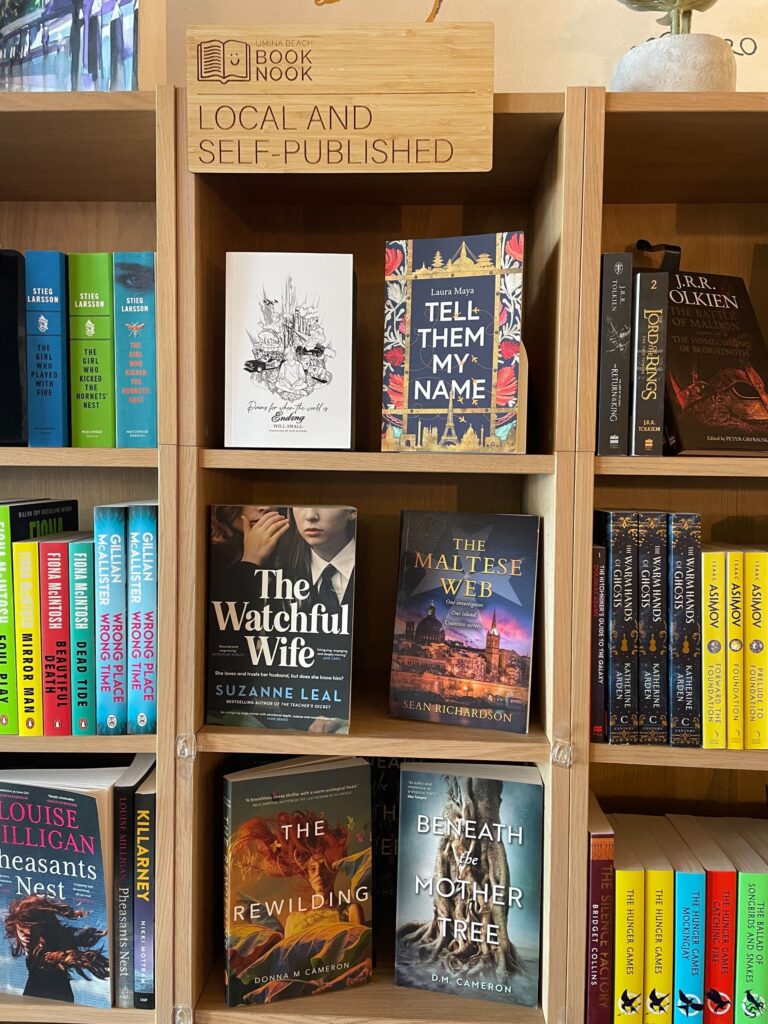Kate Toon is the owner of Umina Beach Book Nook on NSW’s Central Coast and a self-published author herself. She spoke to Independent Publishing to share what she’s learned about publishing and bookselling since taking over the shop.
When did you take over Umina Beach Book Nook? Can you describe what the shop is like and what your goals are for it?
I took over the store in April 2024, but the store has been around for ages. My goal is to really make it an inclusive space, and more diverse. I want readers of all ages and all backgrounds. No snobbery about those who love a bit of romance or fantasy, plenty for kids, lots of great new releases and, of course, the strong literary prize winners. I want it to be a cosy and welcoming space for the community to connect in.
Can you tell us about your books and why you pursued self-publishing?
I’ve written five books now. The first three were self-published, but my last two were published with a traditional publisher (Major Street). Why did I go self-publishing? Well, really, because the publishing world feels like a closed circuit; you have to know someone. I did pitch a few publishers and wasn’t successful. So I decided to go it alone. But for my latest Six Figures series, my pitch was successful. I think there are pros and cons to each path.
Did you have any experience trying to get your self-published titles stocked in bookshops? What was that like, and how did that experience inform your approach to stocking self-published books as a bookshop owner?
With my kids’ book, I remember wandering around bookshops feeling very small and stupid and being rejected by most. Some shops accepted copies on consignment, and I literally never heard from them again: no money, no books back, nothing. It was totally gutting and humiliating.
Even in our store, when I took it over, there was a massive box of books that were taken ‘on consignment’; some had never even been put on the shelf. Most of the authors weren’t in the computer. There was no way to contact them. It was embarrassing, to be honest. You put your heart and soul into a book, and I think all authors should be treated with respect.
Now we have a dedicated area for self-published and local books, and we have a form for authors to fill out. We take three books on consignment and set very clear expectations. We also promote on socials and in our newsletter.
As a bookseller, how do you pitch self-published books to customers?
Obviously, booksellers are much better at selling books they’ve actually read and loved. It’s hard for us to read everything, so we have a Facebook community where we often get our customers to read and recommend titles. But we sell them just like other books, based on the readers’ likes and dislikes, and there’s an added edge that people love supporting local writers!
Are there any particular self-published books that are selling well, or that you’re particularly excited about stocking?
Oh, we have a few: The Maltese Web by Sean Richardson is going great, as are Poems for When the World Is Ending by Will Small and Welcome to Ord City by Adrian Deans. And we have more coming.
Since taking over the Book Nook, what have you learned about books and bookselling that you’ll consider while writing your next book?
I think there’s a big difference between writing the book you want to write and writing a book that will sell. It’s great if the Venn diagram crosses, but often it doesn’t. That book about pig raising in NSW might be your passion, and if you’re happy selling 100 or so copies, that’s great. But to really sell, it needs to be on trend or really unusual.
Honestly, it’s hard enough selling books by big, famous authors, let alone small self-published ones.
I also think that authors underestimate the amount of work they need to put in—on social media, their website, podcasts and events. Even if you have a publisher, they won’t do all that hard work for you. Look how many events Michael Robotham goes to; he works hard! You need to work hard, too.
What recommendations do you have for self-published authors looking to get their books stocked in bookshops?
Don’t wander in off the street with your books in your arms. Booksellers are often busy and might not have time to chat. I’d recommend emailing or ringing first and asking about their process, then following up with a visit in store.
Manage your expectations; we can only take three books at a time, because our shop is the size of your bathroom. And remember that the seller will need to add around 50% to your price to make it worth their while.


